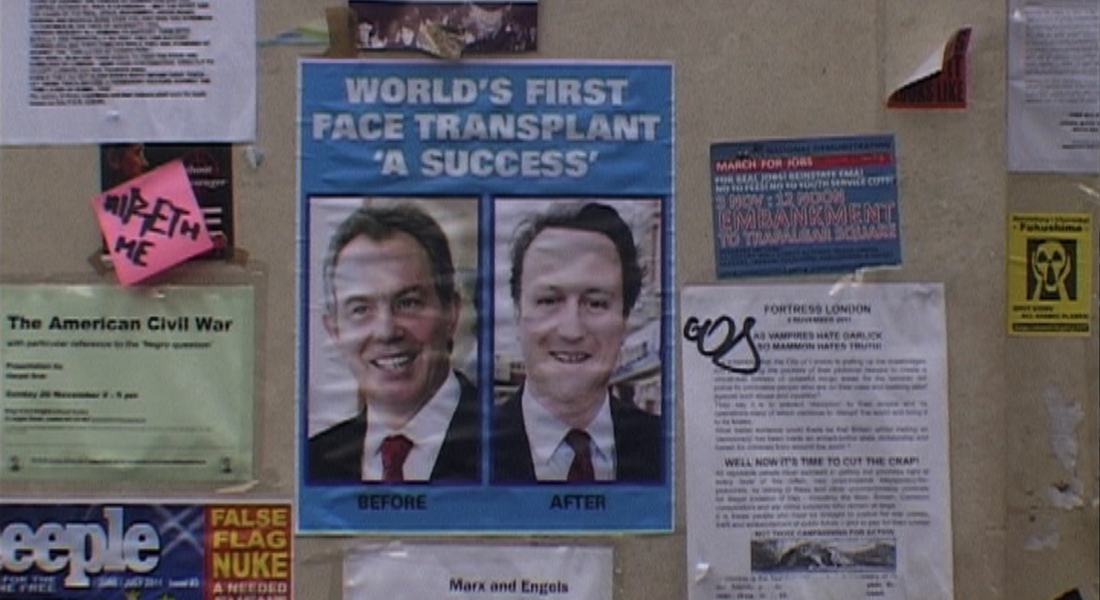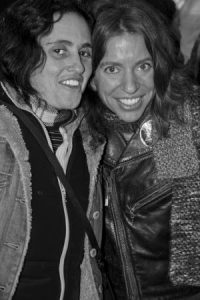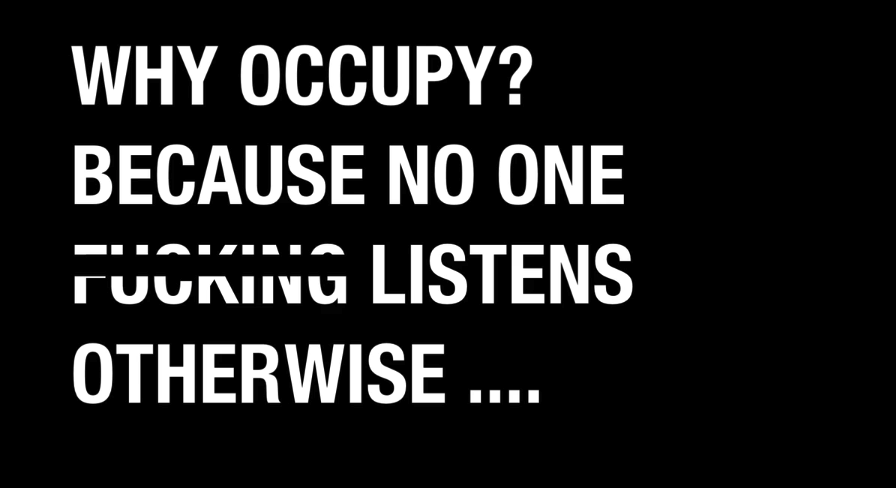Inka

How would you define Occupy ?
An adamant expression of frustration with the power dynamics of our society. These included the democratic deficiency of our parliamentary system and the apparently out-of-control power of the global financial industry/system.
What were you doing before Occupy ?
I had been working on a film called Finger Pointing to the Earth about the perceived holiness of the land of Israel-Palestine. This was as much a political film as it was one that tried to distill the spiritual from religious rhetoric. I had gotten to a stage where the concept of landownership revealed itself the ultimate cause of the conflict as opposed to which nation ‘owned’ the land. I was in my second year of working on that film which involved regular travel to that region whilst I was based in Malta.
Why did you participate in Occupy?
I participated in Occupy because at the time I was deeply committed to being an entity that helped (somehow) in ending the occupation of the West Bank and the imprisonment of the Palestinians in Gaza. I was on a break in the UK when Occupy sprouted. I thought it extraordinary that the protest managed to stay and believed that something ‘special’ was happening. Consequently I felt duty bound to join. Teh connection I made with Occupy and Palestine related to foreign and corproate interest in the occupation. lLondon felt like a powerful place to be a part of a protest against the global financial industry which I believe plays a significant role in financing war. I am not positive about any of this… but that is what inspired me to stay and what I was to learn, was so much more than I thought I did not know! Mainly about the City of London.
I moved in as a camper in the second week. I became the go-to videographer for many on site to film arrests and events. I made about 16 short videos while I was camped there to promote the movement….sort of as a voice from within the movement.
What impact did Occupy have on your personal life?
It overtook my personal life completely. It became my personal life. My ‘other’ personal life, was changed forever.
When the occupation of St.Paul’s ended (Feb 29th 2012) I took a break from it until late 2013 when I became involved in a few working groups again.
In early 2014 I began making a feature with all the footage that I had taken. This has had a huge impact on my personal life because of its longevity and intense work load. I have still not completed it but I will! Put it this way… I would not be living in London if I had not embarked on the making of this film. I would have returned to Australia. Life being what it is, is a series of decisions. Occupy has dictated some major decisions!
Did Occupy change the ways you think, feel and interact with the world? If yes, how so? What do you feel that you learned (or unlearned) that was unique to Occupy?
For what I actually learnt through Occupy please see my film when it is completed!!
I do not mean to mysterious but it was a lot and I am making the film to share it. So this is as good a place as any I believe to plug the film!
Snippet 06 – You Have To Take Up Space from Polly Tikkle Productions on Vimeo.
Tense at St. Paul’s – An Occupy London film website : http://www.occupylondonfilm.com/
What impact do you think Occupy has had on the economic and political situation?
There are three main goals to any campaign (or so the academics claim)
1) to raise public awareness of a given cause, (person, organization, service)
2) to give credibility to that cause, (person, organization, service)
3) to lead to an action of sorts (a vote / a change in behavior – social change / money exchange etc)
It is impossible to distill Occupy’s impact (so as to measure it) on the economic and political situation.
What can be claimed is that Occupy gave an underlying wide spread credibility to all financial and tax reform initiatives. Occupy had scores of academics and unionists support our protest through peer reviewed articles, books and films and in their talks. We have shifted the starting point for all campaigns on financial reform. This is a huge achievement, gives all current and future campaigns an incredible boost by freeing them to be more creative to publicly mobilize and politically lobby.
One can compare Occupy’s work to the work that has been done in the past on educating the public that smoking is bad. Now everyone knows that smoking is bad for you…. and campaigns to quit smoking therefore have the freedom to be more creative, engaging and punchy because the underlying information is there.
Everyone now knows that the global financial industry needs dire reform and the current campaigns that are working towards this end do not need to convince the public at large of it.
Given the current political and economic situation, what is your view on what people can do to bring long lasting systemic change?
What people can do is not as important imho as firstly knowing the big picture they are working towards. The reason I say this is because a great deal of what us social campaigners do is react. Our direction is forever dictated by what we oppose. For example nothing is more meaningless when searching for a vision of a better world than being ‘anti-capitalist’. Its like knowing which street to not go down in a city full of streets. Not exactly an inspiring navigator into the future hey?
So what are you for? Do you know? Figure it out. Does land cost you 30 years to pay off in your vision of the future? In the past believers of set ideologies or religions had the big questions mostly addressed but we do not. It is time to manifest coherent ideologies again rather than assume that one consumer-based-single-issue-campaign after another is going to pave the way to a better world. It is guaranteed not to.
As for the fires to put out along the way?
Are you for an earth where climate change is not an issue? Then best stop eating meat seeing as the meat industry is by far and wide the biggest culprit. Would you prefer a Britain with less migrants? Then do all you can to stop Britain from contributing to wars that create refugees, including selling arms. Don’t vote for hawkish governments is the simplest you can do. Lobby for an end to arms selling is another. Do you want your local library to stay open? Then get involved with the group who is trying to keep it open, don’t just sign the petition! Would you like your children to grow up in city that may not make them sick because of air toxins in London being higher than acceptable EU standards, then do not drive a car in London, or buy an electric one. These are just some of my suggestions.
The bottom line is to not expect other unpaid activists to do all the work for you or sadly the government!
Democracy is not a free ride.
Before Occupy, were you involved in activities related to the reasons why you participated in Occupy? (Activist groups, campaign groups, media platforms, volunteering, research, etc)
Yes
Which ones?
Many moons ago I started out in the Squatter Union of Victoria based in Melbourne. We logged empty houses and wrote HOW TO flyers and booklets, while squatting ourselves. I was an adamant advocate of knowing who the owner was before squatting to weigh up the likely hood of trouble which was never desired. That experience made me aware of how bias the main stream media was against squatters even when we enhanced a decaying property and contributed to a community. I was then motivated to go back to college and learn audio visual skills to be able to make independent media. Since the mid 90’s I have offered my skills and kit to movements I felt a strong affinity with. LGBTQi issues and political/independent theater and events took up the 90’s, the International Solidarity Movement and various NGOs in the Westbank in the Noughties and Occupy London and NoTTIP for which I also played an organizational role in the Twentyteens.
Are you still involved in activities related to the reasons why you participated in Occupy? (Activist groups, campaign groups, media platforms, volunteering, research, etc)
Yes
Which ones?
 As above, the formula continues. For the last few years my work of love-activism has mainly been in the making of the film Tense at St. Paul’s which I am yet to complete. I have also gotten paid work in the third sector as a film maker which I am very happy about because like all of us, I have to pay rent and bills. I was a very active part of the NoTTIP movement in 2014.
As above, the formula continues. For the last few years my work of love-activism has mainly been in the making of the film Tense at St. Paul’s which I am yet to complete. I have also gotten paid work in the third sector as a film maker which I am very happy about because like all of us, I have to pay rent and bills. I was a very active part of the NoTTIP movement in 2014.
I am longing to complete the film to be able to sink my teeth back into some ‘real’ actvism. What I mean by that is body on the line stuff and lobbying decision makers. The making of the film has brought home to me the importance of occupation and putting your physical body into your convictions, be it in marches, actions or occupying. There is something about the virtual intellectual world of film and academia, blogs and memes, facebook and websites that is incredibly seductive and yet sickly somehow. I am longing to get out of the goo!
“But I say balance, balance, balance, balance” Ani Di Franco (who I am pictured with, who visited the camp) in the song Splinter that she sang for us.
Are you still actively working or engaged with people that you met through Occupy?
Yes
What kind of activities are you doing together?
Mostly on a social-political level. We see each other at events that either they are organising or I am filming or we are simply punters in.
